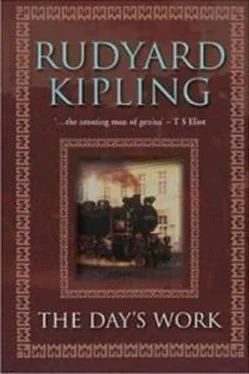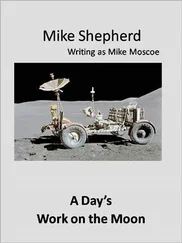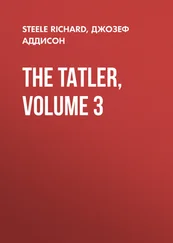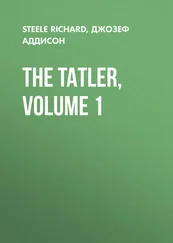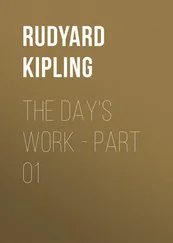Джозеф Киплинг - The Day's Work - Volume 1
Здесь есть возможность читать онлайн «Джозеф Киплинг - The Day's Work - Volume 1» весь текст электронной книги совершенно бесплатно (целиком полную версию без сокращений). В некоторых случаях можно слушать аудио, скачать через торрент в формате fb2 и присутствует краткое содержание. Год выпуска: 2014, Издательство: epubBooks Classics, Жанр: Прочие приключения, на английском языке. Описание произведения, (предисловие) а так же отзывы посетителей доступны на портале библиотеки ЛибКат.
- Название:The Day's Work - Volume 1
- Автор:
- Издательство:epubBooks Classics
- Жанр:
- Год:2014
- ISBN:нет данных
- Рейтинг книги:3 / 5. Голосов: 1
-
Избранное:Добавить в избранное
- Отзывы:
-
Ваша оценка:
- 60
- 1
- 2
- 3
- 4
- 5
The Day's Work - Volume 1: краткое содержание, описание и аннотация
Предлагаем к чтению аннотацию, описание, краткое содержание или предисловие (зависит от того, что написал сам автор книги «The Day's Work - Volume 1»). Если вы не нашли необходимую информацию о книге — напишите в комментариях, мы постараемся отыскать её.
The Day's Work - Volume 1 — читать онлайн бесплатно полную книгу (весь текст) целиком
Ниже представлен текст книги, разбитый по страницам. Система сохранения места последней прочитанной страницы, позволяет с удобством читать онлайн бесплатно книгу «The Day's Work - Volume 1», без необходимости каждый раз заново искать на чём Вы остановились. Поставьте закладку, и сможете в любой момент перейти на страницу, на которой закончили чтение.
Интервал:
Закладка:
There were Rod and Rick, the seniors on the farm. They were the regular road–pair, bay with black points, full brothers, aged, sons of a Hambletonian sire and a Morgan dam. There were Nip and Tuck, seal–browns, rising six, brother and sister, Black Hawks by birth, perfectly matched, just finishing their education, and as handsome a pair as man could wish to find in a forty–mile drive. There was Muldoon, our ex–car–horse, bought at a venture, and any colour you choose that is not white; and Tweezy, who comes from Kentucky, with an affliction of his left hip, which makes him a little uncertain how his hind legs are moving. He and Muldoon had been hauling gravel all the week for our new road. The Deacon you know already. Last of all, and eating something, was our faithful Marcus Aurelius Antoninus, the black buggy–horse, who had seen us through every state of weather and road, the horse who was always standing in harness before some door or other—a philosopher with the appetite of a shark and the manners of an archbishop. Tedda Gabler was a new "trade," with a reputation for vice which was really the result of bad driving. She had one working gait, which she could hold till further notice; a Roman nose; a large, prominent eye; a shaving–brush of a tail; and an irritable temper. She took her salt through her bridle; but the others trotted up nuzzling and wickering for theirs, till we emptied it on the clean rocks. They were all standing at ease, on three legs for the most part, talking the ordinary gossip of the Back Pasture—about the scarcity of water, and gaps in the fence, and how the early windfalls tasted that season—when little Rick blew the last few grains of his allowance into a crevice, and said:
"Hurry, boys! 'Might ha' knowed that livery plug would be around."
We heard a clatter of hooves, and there climbed up from the ravine below a fifty–center transient—a wall–eyed, yellow frame–house of a horse, sent up to board from a livery–stable in town, where they called him "The Lamb," and never let him out except at night and to strangers. My companion, who knew and had broken most of the horses, looked at the ragged hammer–head as it rose, and said quietly:
"Ni–ice beast. Man–eater, if he gets the chance—see his eye. Kicker, too—see his hocks. Western horse."
The animal lumbered up, snuffling and grunting. His feet showed that he had not worked for weeks and weeks, and our creatures drew together significantly.
"As usual," he said, with an underhung sneer—"bowin' your heads before the Oppressor that comes to spend his leisure gloatin' over you."
"Mine's done," said the Deacon; he licked up the remnant of his salt, dropped his nose in his master's hand, and sang a little grace all to himself. The Deacon has the most enchanting manners of any one I know.
"An' fawnin' on them for what is your inalienable right. It's humiliatin'," said the yellow horse, sniffing to see if he could find a few spare grains.
"Go daown hill, then, Boney," the Deacon replied. "Guess you'll find somethin' to eat still, if yer hain't hogged it all. You've ett more'n any three of us to–day—an' day 'fore that—an' the last two months—sence you've been here."
"I am not addressin' myself to the young an' immature. I am speakin' to those whose opinion an' experience commands respect."
I saw Rod raise his head as though he were about to make a remark; then he dropped it again, and stood three–cornered, like a plough–horse. Rod can cover his mile in a shade under three minutes on an ordinary road to an ordinary buggy. He is tremendously powerful behind, but, like most Hambletonians, he grows a trifle sullen as he gets older. No one can love Rod very much; but no one can help respecting him.
"I wish to wake those," the yellow horse went on, "to an abidin' sense o' their wrongs an' their injuries an' their outrages."
"Haow's that?" said Marcus Aurelius Antoninus, dreamily. He thought Boney was talking of some kind of feed.
"An' when I say outrages and injuries"—Boney waved his tail furiously "I mean 'em, too. Great Oats! That's just what I do mean, plain an' straight."
"The gentleman talks quite earnest," said Tuck, the mare, to Nip, her brother. "There's no doubt thinkin' broadens the horizons o' the mind. His language is quite lofty."
"Hesh, sis," Nip answered.
"He hain't widened nothin' 'cep' the circle he's ett in pasture. They feed words fer beddin' where he comes from."
"It's elegant talkin', though," Tuck returned, with an unconvinced toss of her pretty, lean little head.
The yellow horse heard her, and struck an attitude which he meant to be extremely impressive. It made him look as though he had been badly stuffed.
"Now I ask you, I ask you without prejudice an' without favour,—what has Man the Oppressor ever done for you?—Are you not inalienably entitled to the free air o' heaven, blowin' acrost this boundless prairie?"
"Hev ye ever wintered here?" said the Deacon, merrily, while the others snickered. "It's kinder cool."
"Not yet," said Boney. "I come from the boundless confines o' Kansas, where the noblest of our kind have their abidin' place among the sunflowers on the threshold o' the settin' sun in his glory."
"An' they sent you ahead as a sample?" said Rick, with an amused quiver of his long, beautifully groomed tail, as thick and as fine and as wavy as a quadroon's back hair.
"Kansas, sir, needs no advertisement. Her native sons rely on themselves an' their native sires. Yes, sir."
Then Tweezy lifted up his wise and polite old head. His affliction makes him bashful as a rule, but he is ever the most courteous of horses.
"Excuse me, suh," he said slowly, "but, unless I have been misinfohmed, most of your prominent siahs, suh, are impo'ted from Kentucky; an' I'm from Paduky."
There was the least little touch of pride in the last words.
"Any horse dat knows beans," said Muldoon, suddenly (he had been standing with his hairy chin on Tweezy's broad quarters), "gits outer Kansas 'fore dey crip his shoes. I blew in dere from Ioway in de days o' me youth an' innocence, an' I wuz grateful when dey boxed me fer N' York. You can't tell me anything about Kansas I don't wanter fergit. De Belt Line stables ain't no Hoffman House, but dey're Vanderbilts 'longside o' Kansas."
"What the horses o' Kansas think to–day, the horses of America will think to–morrow; an' I tell you that when the horses of America rise in their might, the day o' the Oppressor is ended."
There was a pause, till Rick said, with a little grunt:
"Ef you put it that way, every one of us has riz in his might, 'cep' Marcus, mebbe. Marky, 'j ever rise in yer might?"
"Nope," said Marcus Aurelius Antoninus, thoughtfully quidding over a mouthful of grass. "I seen a heap o' fools try, though."
"You admit that you riz?" said the Kansas horse, excitedly. "Then why—why in Kansas did you ever go under again?"
"Horse can't walk on his hind legs all the time," said the Deacon.
"Not when he's jerked over on his back 'fore he knows what fetched him. We've all done it, Boney," said Rick. "Nip an' Tuck they tried it, spite o' what the Deacon told 'em; an' the Deacon he tried it, spite o' what me an' Rod told him; an' me an' Rod tried it, spite o' what Grandee told us; an' I guess Grandee he tried it, spite o' what his dam told him. It's the same old circus from generation to generation. 'Colt can't see why he's called on to back. Same old rearm' on end—straight up. Same old feelin' that you've bested 'em this time. Same old little yank at your mouth when you're up good an' tall. Same old Pegasus–act, wonderin' where you'll 'light. Same old wop when you hit the dirt with your head where your tail should be, and your in'ards shook up like a bran–mash. Same old voice in your ear: 'Waal, ye little fool, an' what did you reckon to make by that?' We're through with risin in our might on this farm. We go to pole er single, accordin' ez we're hitched."
Читать дальшеИнтервал:
Закладка:
Похожие книги на «The Day's Work - Volume 1»
Представляем Вашему вниманию похожие книги на «The Day's Work - Volume 1» списком для выбора. Мы отобрали схожую по названию и смыслу литературу в надежде предоставить читателям больше вариантов отыскать новые, интересные, ещё непрочитанные произведения.
Обсуждение, отзывы о книге «The Day's Work - Volume 1» и просто собственные мнения читателей. Оставьте ваши комментарии, напишите, что Вы думаете о произведении, его смысле или главных героях. Укажите что конкретно понравилось, а что нет, и почему Вы так считаете.
